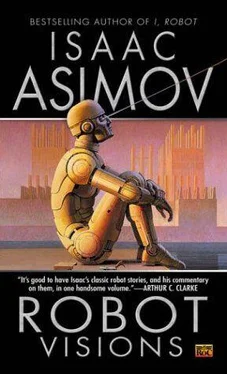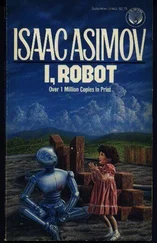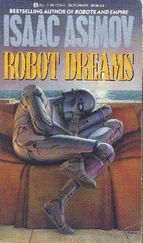Isaac Asimov - Robot Visions
Здесь есть возможность читать онлайн «Isaac Asimov - Robot Visions» весь текст электронной книги совершенно бесплатно (целиком полную версию без сокращений). В некоторых случаях можно слушать аудио, скачать через торрент в формате fb2 и присутствует краткое содержание. Жанр: Фантастика и фэнтези, на английском языке. Описание произведения, (предисловие) а так же отзывы посетителей доступны на портале библиотеки ЛибКат.
- Название:Robot Visions
- Автор:
- Жанр:
- Год:неизвестен
- ISBN:нет данных
- Рейтинг книги:5 / 5. Голосов: 1
-
Избранное:Добавить в избранное
- Отзывы:
-
Ваша оценка:
- 100
- 1
- 2
- 3
- 4
- 5
Robot Visions: краткое содержание, описание и аннотация
Предлагаем к чтению аннотацию, описание, краткое содержание или предисловие (зависит от того, что написал сам автор книги «Robot Visions»). Если вы не нашли необходимую информацию о книге — напишите в комментариях, мы постараемся отыскать её.
Robot Visions — читать онлайн бесплатно полную книгу (весь текст) целиком
Ниже представлен текст книги, разбитый по страницам. Система сохранения места последней прочитанной страницы, позволяет с удобством читать онлайн бесплатно книгу «Robot Visions», без необходимости каждый раз заново искать на чём Вы остановились. Поставьте закладку, и сможете в любой момент перейти на страницу, на которой закончили чтение.
Интервал:
Закладка:
“We’ve done two things, Andrew,” said DeLong, “both of which are good. First of all, we have established the fact that no number of artificial parts in the human body causes it to cease being a human body. Secondly, we have engaged public opinion in the question in such a way as to put it fiercely on the side of a broad interpretation of humanity, since there is not a human being in existence who does not hope for prosthetics if they will keep him alive.”
“And do you think the Legislature will now grant me my humanity?” Andrew asked.
DeLong looked faintly uncomfortable. “As to that, I cannot be optimistic. There remains the one organ which the World Court has used as the criterion of humanity. Human beings have an organic cellular brain and robots have a platinum iridium positronic brain if they have one at all- and you certainly have a positronic brain. No, Andrew, don’t get that look in your eye. We lack the knowledge to duplicate the work of a cellular brain in artificial structures close enough to the organic type as to allow it to fall within the court’s decision. Not even you could do it.”
“What should we do, then?”
“Make the attempt, of course. Congresswoman Li-hsing will be on our side and a growing number of other congress people. The President will undoubtedly go along with a majority of the Legislature in this matter.”
“Do we have a majority?”
“No. Far from it. But we might get one if the public will allow its desire for a broad interpretation of humanity to extend to you. A small chance, I admit; but if you do not wish to give up, we must gamble for it.”
“I do not wish to give up.”
Congresswoman Li-hsing was considerably older than she had been when Andrew had first met her. Her transparent garments were long gone. Her hair was now close-cropped and her coverings were tubular. Yet still Andrew clung, as closely as he could within the limits of reasonable taste, to the style of clothing that had prevailed when he had first adopted clothing more than a century before.
“We’ve gone as far as we can, Andrew,” Li-hsing admitted. “We’ll try once more after recess, but, to be honest, defeat is certain and then the whole thing will have to be given up. All my most recent efforts have only earned me certain defeat in the coming congressional campaign.”
“I know,” said Andrew, “and it distressed me. You said once you would abandon me if it came to that. Why have you not done so?”
“One can change one’s mind, you know. Somehow, abandoning you became a higher price than I cared to pay for just one more term. As it is, I’ve been in the Legislature, for over a quarter of a century. It’s enough.”
“Is there no way we can change minds, Chee?”
“We’ve changed all that are amenable to reason. The rest- the majority- cannot be moved from their emotional antipathies.”
“Emotional antipathy is not a valid reason for voting one way or the other.”
“I know that, Andrew, but they don’t advance emotional antipathy as their reason.”
“It all comes down to the brain, then,” Andrew said cautiously. “But must we leave it at the level of cells versus positrons? Is there no way of forcing a functional definition? Must we say that a brain is made of this or that? May we not say that a brain is something- anything- capable of a certain level of thought?”
“Won’t work,” said Li-hsing. “Your brain is manmade, the human brain is not. Your brain is constructed, theirs developed. To any human being who is intent on keeping up the barrier between himself and a robot, those differences are a steel wall a mile high and a mile thick.”
“If we could get at the source of their antipathy, the very source-”
“After all your years,” Li-hsing said, sadly, “you are still trying to reason out the human being. Poor Andrew, don’t be angry, but it’s the robot in you that drives you in that direction.”
“I don’t know,” said Andrew. “If I could bring myself-”
If he could bring himself-
He had known for a long time it might come to that, and in the end he was at the surgeon’s. He had found one, skillful enough for the job at hand- which meant a surgeon- robot, for no human surgeon could be trusted in this connection, either in ability or in intention.
The surgeon could not have performed the operation on a human being, so Andrew, after putting off the moment of decision with a sad line of questioning that reflected the turmoil within himself, had put First Law to one side by saying “I, too, am a robot.”
He then said, as firmly as he had learned to form the words even at human beings over these past decades, “I order you to carry through the operation on me.”
In the absence of the First Law, an order so firmly given from one who looked so much like a man activated the Second Law sufficiently to carry the day.
Andrew’s feeling of weakness was, he was sure, quite imaginary. He had recovered from the- operation. Nevertheless, he leaned, as unobtrusively as he could manage, against the wall. It would be entirely too revealing to sit.
Li-hsing said, “The final vote will come this week, Andrew. I’ve been able to delay it no longer, and we must lose. And that will be it, Andrew.”
“I am grateful for your skill at delay. It gave me the time I needed, and I took the gamble I had to.”
“What gamble is this?” Li-hsing asked with open concern.
“I couldn’t tell you, or even the people at Feingold and Martin. I was sure I would be stopped. See here, if it is the brain that is at issue, isn’t the greatest difference of all the matter of immortality. Who really cares what a brain looks like or is built of or how it was formed. What matters is that human brain cells die; must die. Even if every other organ in the body is maintained or replaced, the brain cells, which cannot be replaced without changing and therefore killing the personality, must eventually die.
“My own positronic pathways have lasted nearly two centuries without perceptible change, and can last for centuries more. Isn’t that the fundamental barrier? Human beings can tolerate an immortal robot, for it doesn’t matter how long a machine lasts, but they cannot tolerate an immortal human being since their own mortality is endurable only so long as it is universal. And for that reason they won’t make me a human being.”
“What is it you’re leading up to, Andrew?” Li-hsing asked.
“I have removed that problem. Decades ago, my positronic brain was connected to organic nerves. Now, one last operation has arranged that connection in such a way that slowly- quite slowly- the potential is being drained from my pathways.”
Li-hsing’s finely wrinkled face showed no expression for a moment. Then her lips tightened. “Do you mean you’ve arranged to die, Andrew? You can’t have. That violates the Third Law.”
“No,” said Andrew, “I have chosen between the death of my body and the death of my aspirations and desires. To have let my body live at the cost of the greater death is what would have violated the Third Law.”
Li-hsing seized his arm as though she were about to shake him. She stopped herself. “Andrew, it won’t work! Change it back.”
“It can’t be done. Too much damage was done. I have a year to live more or less. I will last through the two-hundredth anniversary of my construction. I was weak enough to arrange that.”
“How can it be worth it? Andrew, you’re a fool.”
“If it brings me humanity, that will be worth it. If it doesn’t, it will bring an end to striving and that will be worth it, too.”
Then Li-hsing did something that astonished herself. Quietly, she began to weep.
Читать дальшеИнтервал:
Закладка:
Похожие книги на «Robot Visions»
Представляем Вашему вниманию похожие книги на «Robot Visions» списком для выбора. Мы отобрали схожую по названию и смыслу литературу в надежде предоставить читателям больше вариантов отыскать новые, интересные, ещё непрочитанные произведения.
Обсуждение, отзывы о книге «Robot Visions» и просто собственные мнения читателей. Оставьте ваши комментарии, напишите, что Вы думаете о произведении, его смысле или главных героях. Укажите что конкретно понравилось, а что нет, и почему Вы так считаете.








